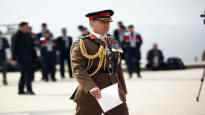According to a BBC investigation, British army special forces killed unarmed people in Afghanistan between 2010 and 2012. According to the report, the forces even competed with each other for the number of kills.
British Army Special Forces (SAS) killed unarmed and prisoners in suspicious circumstances during operations in Afghanistan between 2010 and 2012, the British Broadcasting Corporation BBC’s (switching to another service) the report reveals.
The investigation focuses in particular on the six-month command of one SAS unit, which began in November 2010. The task of the group was mainly to arrest Taliban commanders and stop bomb-making networks in Helmand province.
According to the report, the unit may have illegally killed up to 54 people during the command.
In total, the body count of the SAS group’s six-month command raids is counted in the hundreds, the BBC says.
Competition for the number of bodies
For its story, the BBC analyzed, among other things, hundreds of pages of SAS operational reports, including a dozen reports on “capture or kill” type raids carried out in 2010-2011.
Several members of the SAS team who were on that mission say that they had seen SAS troops kill unarmed people during night raids. In addition, several people who served in the special forces tell the BBC that SAS groups even competed with each other to see who had the longest kill list.
The BBC found similarities in the reports describing the various raids, which it describes as striking. In several cases, the captured Afghan man was taken back to the raided building. The killing is justified by the fact that the arrested would have grabbed a hidden weapon, for example, from behind a curtain or under a mattress.
The interviewed persons say that they have witnessed the cover-up of illegal killings – members of the SAS have subsequently planted weapons at the scene to make the situations look like self-defense.
The BBC also visited several raid sites in Afghanistan. In one of them, bullet holes were found very low in the wall, which, according to the experts interviewed by the BBC, points to an execution-style shooting.
In connection with the raid documents, there have been no injuries to SAS soldiers.
In addition, the report shows that hasty decisions made on the basis of insufficient intelligence led to the fact that ordinary civilians could easily be on the target list of SAS raids.
Events covered up
Representatives of the British Royal Military Police (RMP), which investigated the allegations in different years, tell the BBC that the British defense forces have tried to cover up the events of the operations.
Among other things, e-mails within the special forces and interviews with individuals show that the leadership of the special forces knew about the suspected abuse.
In light of the investigation, it appears that the then head of the SAS, Gen Mark Carleton-Smith did not provide evidence to the military police even when it opened a homicide investigation into one of the raids in 2013.
The British Ministry of Defense responded to allegations made by the BBC that British forces “served in Afghanistan with courage and professionalism”. Carleton-Smith declined to comment on the allegations.
